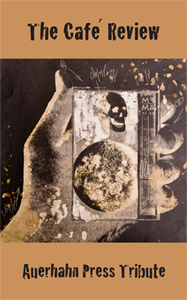As Seen from Provincial Perspectives

by Andrew Hoyem
On a summer morn in southern France,
Toward the end of June when flowers fade
From two months’ brilliance in rising heat,
A guest sits resting, looks out over
Villages, vineyards, hills, mountains,
Seeing birds and insects in a dance:
Bees pull pollen that honey be made;
Swallows swoop arcs, buzzing bugs to eat.
One elder sits, looking out over
An artful garden, with pools, fountains,
Falls, sprinklers spraying soil of Provence,
Dry land for farming grapes. In the shade
Of exotic trees, well – watered, is a seat.
An alien sits, looking out over
Follies from foreign places with stains
Of age, stone cut by Mayans, by chance,
By Romans, broken by dolts, afraid
That graven rocks hold power. At their feet
A senior sits, looking out over
Sites of ancient ruins, tracks for trains
To Paris, roads to Rome, in distance.
Quiet, not silent, soft serenade
Is heard afar, cattle low, sheep bleat.
This poet sits, looking out over
An amazing maze; a grotto contains
Seven concrete dwarves in blissful trance;
Just east, a little Japanese glade.
By the chateau, under arbor neat,
Someone sits resting, looks out over
The globe. A crystal orb flashing planes
Revolves in space. All amenities,
Cabinets of curiosities,
Inert artifacts are housed here, while
Outside is nature constrained by style.
A Blue Sunset Sits on an Orange Horizon

by Daniel Abdal-Hayy Moore
They trail their hands in the water
Their feet hit the cold hard ground
Their faces light up dark corners
Their eyes are wet with light
They move with a deep resilience
They fall into shadows and out again
People who meet them are amazed
They do nothing to attract attention
Their mode is invisibility
I’ve seen one or two of them close up
As in all of us most of them is hidden
As in all of us they dwell in sweetness
When a light in the dark is ignited
A spinning takes place like earth’s orbit
An Orange Sunset Sits on a Blue Horizon

by Daniel Abdal-Hayy Moore
Laughing Buddha sits down with Weeping
Sufi and they sing a song together
that sets fire to the furniture and makes the
river run backwards for a moment while its
fish inside change scales and close their
eyes for the first time in their lives
Hands move across a chessboard but no pieces move
Hair flies up in a breeze and comes down exactly where it
began each strand in place again and
ready for the next revelation
Their eyes lock in an embrace that shivers the coat rack of its
coats that fall in a disarrayed heap with all their
arms out straight as if in surrender or in
imitation of the cross
Laughing Buddha stops laughing for a
moment long enough for Weeping Sufi to
wipe his eyes and the
flock of geese overhead to check their
inner compasses and redirect their flight home
Remembrance and Ongoing Love for Auerhahn Press

by Daniel Abdal-Hayy Moore
Back in the 60s we were all Buddhists. Well, so it seems. Due to Ginsberg and Kerouac’s pervasive influence, Buddhist teachings in small and large things was definitely in the air. Allen even confided to me once in a van on our way to Ferlinghetti’s cabin that it was actually Neal Cassidy who brought Buddhism to our shores, writing him from overseas of this wisdom practice he’d discovered and wanted Allen to know about it. Though, in retrospect I think Alan Watts and D.T. Suzuki of the East Coast were also major forerunners. I sat for a couple of years with Shunryu Suzuki in his first San Francisco Zendo, and it really did change my life, forming a deep basis for my spiritual practice to come as a Muslim Sufi. But among the San Francisco poets, closely aligned with the Dharma or only accessorizing it in atmospheric ways (it was California, after all), we were all Buddhists.
In around 1964 or so, I had my first book of poems, largely written in Mexico after I dropped out of UC Berkeley, Dawn Visions, published by City Lights, and through my friendship with Ruth Weiss I met Philip Lamantia, who mantically described the beginning of a movie I have never seen except still memorable through the intensely fascinating cinema of his words. Dave Haselwood had published Ekstasis, and later Destroyed Works, a cherished copy of which I still have in my library, and whose poem, Morning Light Song (“the heavens proclaim you, Absolute God”) has proven a durable and influential impetus of my own poetry. I can’t now remember how I first found myself in the Auerhahn Press office itself, one bright San Francisco day, with Andrew Hoyem and Glenn Todd running the great clanking letterpress machines as if the Technological Revolution hadn’t yet (and it hadn’t quite) arrived. Old fashioned in the best sense, high art was being practiced and Dave was its High Priest, its sweet promulgator of fineness even then. I remember also noting his casual remarks, never that casual, that often were spot – on target critiques or facet analysis of a line of a poem, or an often slightly arch comment on a particular poet which was never mean but often slicing close to the bone. And the books being produced! Only the Patchen painted originals, of which there was a bin still at City Lights in about 1958 or 9 when I visited the store in my last year of Oakland High School, had that original and somehow raw quality of true beauty. The Auerhahn books so lovingly designed, not in a standard format but matching each book of poems in its particulars, were portals into the poems inside and then out through the poetry into the world.
That Dave Haselwood is now Joko, and dispensing Zen wisdom wedded with wisdom poetry of all kinds, is no surprise.


